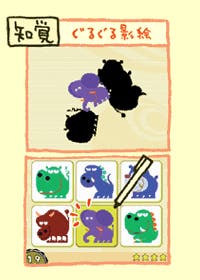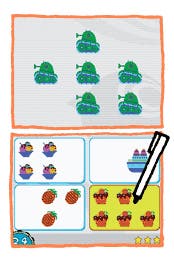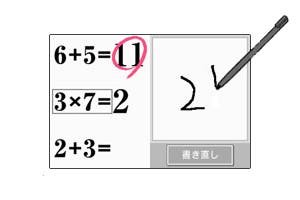Brain Exercise
We get our hands on and heads round Nintendo's brain trainer.
Games that make you more intelligent are right up there on our list of Things That Should Have Been Invented By Now, along with self-cleaning trainers, helium-based beer and a country-wide network of rollercoasters to replace all trains.
So far we've been out of luck - all right, so there have been various studies claiming that games improve your hand-eye co-ordination, but what use is that for apart from tying shoelaces and, er, playing games?
But now Nintendo is stepping up to save the day with the release of Brain Exercise for the DS. There are already several versions available in Japan, and they're all huge hits - especially with older gamers.
The good news is that come March of next year, two Brain Exercise games will be heading to Europe. We got the chance to have a go on the version aimed at younger adults at the Nintendo Summit in Frankfurt recently, and we're pleased to report that it's an awful lot of fun.
Designed for players aged 18 and up, the Brain Exercise game we played features cartoon graphics and is designed to offer Wario Ware-style bursts of entertainment. You're guided through the game by a blobby-looking figure wearing a mortar board, who informs you that he runs the Big Brain Academy - an institution which specialises in measuring cleverness.
The heavier your brain is, apparently, the smarter you are - which sounds about as scientifically sound as the theory that dolphins are super-intelligent (when was the last time you heard of a dolphin writing a symphony, or finding a cure for cancer, or completing Ninja Gaiden on the hardest setting?).
Testing times

To work out the weight of your brain, the game puts you through a series of tests divided into various categories. First up is Shapes, where you are shown a collection of objects - these could be anything from pieces of fruit and bunches of flowers to toy helicopters, teapots and handbags - on the touch screen.
On the top screen, you'll see the silhouettes of some of these objects, which are whizzing all over the place just to make things a bit trickier, and your task is to select the matching shapes on the touch screen. As with all the tests, you've got a tight time limit within which to get it right, and the puzzles get harder each time you complete one successfully.
In the Logic tests, you're shown a series of scales on which different objects are placed, and it's your job to work out which object is the heaviest. Easy when there's only one set of scales - not so when there are three or four, and you have to use a quick mental equation to deduce the answer.
Then there are the Maths tests. Here you see a number of objects on the top screen - seven toy helicopters, let's say. On the touch screen, there will be various collections of objects - in this example, three teapots, four handbags and five bananas. You have to pick which collections add up to the number on the top screen: so, three teapots plus four handbags equals seven helicopters.
And finally there are Memory tests. The top screen displays a sequence of objects, and then one or more of them are blacked out. You have to touch the missing objects on the bottom screen, ignoring all the red herrings.
These are just examples of the tests you get in each category, mind - there will be many more variations in the finished game.
Weight watchers

Once it's all over, the game will give you a breakdown of how you performed in each category, and advice as to which areas you need to work on. You're also told how much your brain weighs, and what kind of brain you have.
On our first attempt, we weighed in at 671g (pretty impressive, we thought, until the game informed us that the average brain weighs 1.4kg) and were told: "You have the brain of a stage director." We gave it another go and this time got 875g, which means we have "the brain of a diplomat", apparently.
There's lots of fun to be had comparing your brain weight and type with other players - one of our rivals was told he had "the brain of a stylist", while even cleverer types were informed they had the brains of Shakespeare and Picasso. Who knows, perhaps if you get the top score you're told you have the brain of Vorderman.
There's also a Wi-Fi multiplayer mode for up to eight opponents, though this wasn't up and running in the version we tried out. We're told there will be no online mode, which is a shame, but don't be surprised if future instalments in the series do make use of the Wi-Fi Connection service.
Age concerns
The second version of Brain Exercise is aimed at old buffers aged 30 and up and takes a much more serious approach. You still have to complete tests within a time limit, but they're trickier and have more of an emphasis on proper maths than colourful objects.
There's also more of an emphasis on improving your intelligence. You can keep track of your progress via an in-game diary - each time you play, you'll get a stamp in your diary, up to a maximum of one per day.
Your cleverness isn't measured in terms of how much your brain weighs, but with regard to its age. The first time you play, you'll be told that it's very old. The idea is that the more you play, the more your skills and reaction times will improve, and the younger your brain will get. The ultimate aim is to develop the brain of a 20 year-old.

Again, we're not quite sure how scientific this is, but if the adult version of Brain Exercise is half as much fun as the one we played it should be well worth a look. So why is it quite so enjoyable? Well, just as with Wario Ware and Project Rub, there's something highly entertaining about quick, simple, well-designed puzzles that have you frantically racing against the clock. Plus there's the added incentive of trying to better your score and prove once and for all that you're more cleverer than what everyone else is.
But perhaps we like Brain Exercise most of all because it offers something different from the usual array of first-person shooters, third person gangbangers and super shiny racers that other publishers are constantly coughing out. What with the likes of this, Trauma Centre: Under the Knife and Phoenix Wright: Ace Attorney on the way, it's a good time to be a DS owner if you like your games a little bit different.


